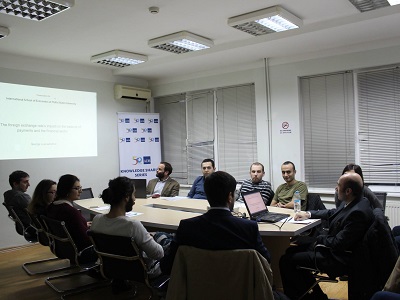On December 1, ISET hosted two economists of the Asian Development Bank (ADB), George Luarsabishvili (Economist, Georgian Resident Mission, Central and West Asia Department) and Dominik Peschel (Economist, Central and West Asia Department). Mr. Luarsabishvili gave a presentation entitled “The foreign exchange rate’s impact on the balance of payments and the financial sector”, during which he overviewed the effect of the recent currency depreciation to the balance of payment and financial stability of Georgia. In addition, the two guests outlined the effectiveness and timing of the current de-dollarization strategy implemented by the Georgian government.
At the beginning of the presentation, Mr. Luarsabishvili examined linkages between currency depreciation and current account deficit. He claimed that the lari's depreciation should make domestic production more competitive in the foreign market, increase export and improve current account. However, due to high and persistent dollarization, depreciation limits economic growth and aggravates foreign debt servicing. In this fashion, currency depreciation can be contractionary.
The next energy revolution is on our doorstep, and it is going to be driven by renewable power generation technologies. In contrast, power transmission network projects worth USD 40 trillion are being financed through different state and private investments all around the world. Mr. Michael Delphia, Senior Energy expert at USAID’s Governing for Growth Project discussed the concept of market-centered energy planning (M-CEP) with the ISET community at an open lecture.
Technological advancements in the energy sector pushed renewable energy (such as wind and solar power) to being more competitive compared to conventional sources of power. New energy systems iare primarily characterized with a large number of customers producing electricity themselves. Furthermore, cheaper renewable energy technologies push power prices down, making different industries more competitive. Large wind farms or solar energy technologies are mostly needed for providing operating reserves. However, recent developments in energy storage technologies are phenomenal, and are going to transform the entire grid towards using more renewable technologies, as well as support development of 24/7 solar power for households.
On November 10, ISET hosted an EBRD group with a keynote speaker, Alexander Plekhanov, Deputy Director of Research at the European Bank for Reconstruction and Development in London. He presented the EBRD’s Transition Report, entitled “Transition for All: Equal Opportunities in an Unequal World”. During a one-hour presentation, Dr. Plekhanov mainly concentrated on three parts of the report: convergence and inequality, the impact of transition on well-being and inequality of opportunity. The results of the report are based on a household survey during the first months of 2016, named “The third round of the Life in Transition Survey (LiTS III)”. The survey included data from 34 countries, and was conducted by the EBRD and the World Bank.













